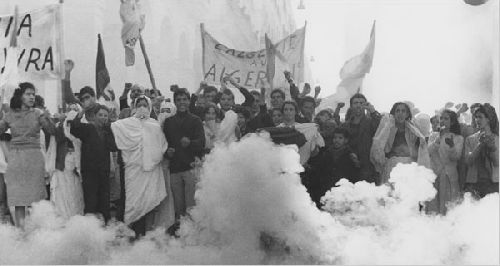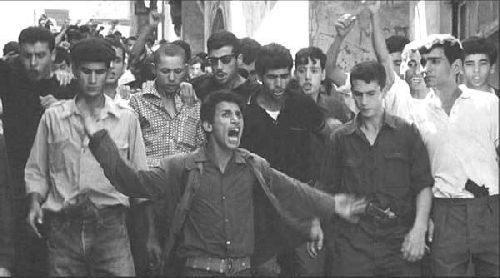Chicago Indymedia : http://chicago.indymedia.org/archive
News :: Media
Gillo Pontecorvo, director of 'The Battle of Algiers,' dies at 86
Rome, Oct. 13(AP): Italian filmmaker Gillo Pontecorvo, who directed the black-and-white classic ``The Battle of Algiers,'' has died in Rome, hospital officials said on Friday. He was 86.

Sad news: Gillo Pontecorvo, the Italian director of classic films of the late 1950s and 60s, including Kapo, Queimada, and The Battle of Algiers has died. He was 86 years old.
As a director, Pontecorvo left an indelible mark on the Left and the filmgoing world at large with only a few feature films. Revolutionaries of all ages will always have their memories of the first time they watched The Battle of Algiers -- be it in the arthouse in its original run, with some projector purloined from the campus AV room thereafter, or (as my generation did) from some poorly transferred and washed out VHS tape. This says volumes, considering the Spielbergs and Bruckheimers of the current American culture industry have had so little to say in volumes of films loaded with all manner of special effects and released on blockbuster scale.
There is so much to say about the wonderful art that Pontecorvo left behind, and that will have its day. But for those less familiar with his body of work, the first step to understanding the underlying themes of Pontecorvo's film is to know something of Pontecorvo himself. He was born in Italy at the time when Italy and Europe were in the midst of the rise of fascism. At a very young age, he came to lead the Italian anti-Fascist resistance in his area, and at the age of 20 was shuffling between Milan and France to unite with other resisters.
It is in this experience in the resistance that it seems Pontecorvo came to know both conflict and how to document it; for his part of the Italian resistance was in taking reconnaissance photographs of the enemy. As a result, he came to direct with a style he dubbed "The Dictatorship of the Truth" -- a style of filming in which even the most atrocious or triumphal acts were depicted in a matter-of-fact manner.
This style was taken to its absolute limits in two of Pontecorvo's films, both indictments of twin evils of the 20th Century -- 1959's Kapo and 1966's The Battle of Algiers. The former indicted Fascism/Nazism, depicting the utter decadence and dehumanization of Northern Italy in the final days of World War II in Europe (in which Northern Italy slid downward from a co-equal of Nazi Germany to more of an appendage of Nazi German power). The latter indicted French colonialism and Western imperialism in general, depicting the ruthless suppression of independence struggle in Algeria. However unleashing the passions of the human spirit, Pontecorvo's lens is always dispassionate, while never eschewing his own radical politics.
However dispassionate, the French right-wing never failed to criticize Pontecorvo and The Battle of Algiers (which was banned for a period of time in that country). Most of that criticism centers around Pontecorvo having depicted Northern African Arabs and Berbers with both an individual and collective dignity -- a matter which given the uprising of the banlieue and the reaction of the French Right (and, it should be noted, that of their American sympathizers) are worth paying attention.
Pontecorvo's directorial career was mercurial at best; after The Battle of Algiers it seems that he was content to rest on his laurels, directing a critically derided (and little seen) film on Basque ETA, then settling into low-key direction of commercials and small films. The Battle came back to prominence not by Pontecorvo's new endeavors, but by the Pentagon screening of it -- for the bizarre purpose of learning how to subjugate Arabs (this, merely months before Abu Ghraib). This led to a re-release of the film in the arthouses, and in a Criterion Collection 3-disc set.
However "lazy" Pontecorvo had became, his work on The Battle of Algiersremains evergreen, and unfolds in new layers. It is a credit to Pontecorvo that his single work dwarfs all put up against it.
Gillo Pontecorvo -- ¡Presente!
As a director, Pontecorvo left an indelible mark on the Left and the filmgoing world at large with only a few feature films. Revolutionaries of all ages will always have their memories of the first time they watched The Battle of Algiers -- be it in the arthouse in its original run, with some projector purloined from the campus AV room thereafter, or (as my generation did) from some poorly transferred and washed out VHS tape. This says volumes, considering the Spielbergs and Bruckheimers of the current American culture industry have had so little to say in volumes of films loaded with all manner of special effects and released on blockbuster scale.
There is so much to say about the wonderful art that Pontecorvo left behind, and that will have its day. But for those less familiar with his body of work, the first step to understanding the underlying themes of Pontecorvo's film is to know something of Pontecorvo himself. He was born in Italy at the time when Italy and Europe were in the midst of the rise of fascism. At a very young age, he came to lead the Italian anti-Fascist resistance in his area, and at the age of 20 was shuffling between Milan and France to unite with other resisters.
It is in this experience in the resistance that it seems Pontecorvo came to know both conflict and how to document it; for his part of the Italian resistance was in taking reconnaissance photographs of the enemy. As a result, he came to direct with a style he dubbed "The Dictatorship of the Truth" -- a style of filming in which even the most atrocious or triumphal acts were depicted in a matter-of-fact manner.
This style was taken to its absolute limits in two of Pontecorvo's films, both indictments of twin evils of the 20th Century -- 1959's Kapo and 1966's The Battle of Algiers. The former indicted Fascism/Nazism, depicting the utter decadence and dehumanization of Northern Italy in the final days of World War II in Europe (in which Northern Italy slid downward from a co-equal of Nazi Germany to more of an appendage of Nazi German power). The latter indicted French colonialism and Western imperialism in general, depicting the ruthless suppression of independence struggle in Algeria. However unleashing the passions of the human spirit, Pontecorvo's lens is always dispassionate, while never eschewing his own radical politics.
However dispassionate, the French right-wing never failed to criticize Pontecorvo and The Battle of Algiers (which was banned for a period of time in that country). Most of that criticism centers around Pontecorvo having depicted Northern African Arabs and Berbers with both an individual and collective dignity -- a matter which given the uprising of the banlieue and the reaction of the French Right (and, it should be noted, that of their American sympathizers) are worth paying attention.
Pontecorvo's directorial career was mercurial at best; after The Battle of Algiers it seems that he was content to rest on his laurels, directing a critically derided (and little seen) film on Basque ETA, then settling into low-key direction of commercials and small films. The Battle came back to prominence not by Pontecorvo's new endeavors, but by the Pentagon screening of it -- for the bizarre purpose of learning how to subjugate Arabs (this, merely months before Abu Ghraib). This led to a re-release of the film in the arthouses, and in a Criterion Collection 3-disc set.
However "lazy" Pontecorvo had became, his work on The Battle of Algiersremains evergreen, and unfolds in new layers. It is a credit to Pontecorvo that his single work dwarfs all put up against it.
Gillo Pontecorvo -- ¡Presente!
Information Library
Views
Search
Account Login
Media Centers
- worcester
- western mass
- vermont
- urbana-champaign
- tennessee
- tampa bay
- seattle
- sarasota
- santa cruz, ca
- santa barbara
- san francisco bay area
- san francisco
- san diego
- saint louis
- rogue valley
- rochester
- richmond
- portland
- pittsburgh
- philadelphia
- oklahoma
- nyc
- north texas
- north carolina
- new orleans
- new mexico
- new hampshire
- minneapolis/st. paul
- milwaukee
- michigan
- miami
- maine
- madison
- la
- kansas city
- hudson mohawk
- houston
- hawaii
- dc
- columbus
- colorado
- cleveland
- chicago
- charlottesville
- buffalo
- boston
- binghamton
- big muddy
- baltimore
- austin indymedia
- austin
- atlanta
- asheville
- arkansas
- arizona
- valencia
- united kingdom
- ukraine
- toulouse
- toscana
- torun
- switzerland
- sverige
- scotland
- sardegna
- russia
- romania
- roma
- portugal
- poland
- piemonte
- patras
- paris/Île-de-france
- oost-vlaanderen
- nottingham
- norway
- northern england
- nice
- netherlands
- napoli
- nantes
- marseille
- malta
- madrid
- london
- lombardia
- linksunten
- lille
- liguria
- liege
- la plana
- italy
- istanbul
- ireland
- hungary
- grenoble
- germany
- galiza
- euskal herria
- estrecho / madiaq
- emilia-romagna
- cyprus
- croatia
- calabria
- bulgaria
- brussels
- bristol
- belgrade
- belgium
- belarus
- barcelona
- austria
- athens
- armenia
- antwerpen
- andorra
- alacant
- abruzzo
This site made manifest by dadaIMC software





